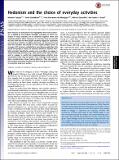Hedonism and the choice of everyday activities
Author(s)
Taquet, Maxime; Quoidbach, Jordi; de Montjoye, Yves-Alexandre; Desseilles, Martin; Gross, James J.
DownloadTaquet-2016-Hedonism and the cho.pdf (586.1Kb)
PUBLISHER_POLICY
Publisher Policy
Article is made available in accordance with the publisher's policy and may be subject to US copyright law. Please refer to the publisher's site for terms of use.
Terms of use
Metadata
Show full item recordAbstract
Most theories of motivation have highlighted that human behavior is guided by the hedonic principle, according to which our choices of daily activities aim to minimize negative affect and maximize positive affect. However, it is not clear how to reconcile this idea with the fact that people routinely engage in unpleasant yet necessary activities. To address this issue, we monitored in real time the activities and moods of over 28,000 people across an average of 27 d using a multiplatform smartphone application. We found that people’s choices of activities followed a hedonic flexibility principle. Specifically, people were more likely to engage in mood-increasing activities (e.g., play sports) when they felt bad, and to engage in useful but mood-decreasing activities (e.g., housework) when they felt good. These findings clarify how hedonic considerations shape human behavior. They may explain how humans overcome the allure of short-term gains in happiness to maximize long-term welfare.
Date issued
2016-08Department
Massachusetts Institute of Technology. Media LaboratoryJournal
Proceedings of the National Academy of Sciences
Publisher
National Academy of Sciences (U.S.)
Citation
Taquet, Maxime; Quoidbach, Jordi; de Montjoye, Yves-Alexandre; Desseilles, Martin and Gross, James J. “Hedonism and the Choice of Everyday Activities.” Proceedings of the National Academy of Sciences 113, no. 35 (August 2016): 9769–9773. © 2016 National Academy of Sciences
Version: Final published version
ISSN
0027-8424
1091-6490